“What unites these people? They don’t give a damn”: interview with Red Cross employee Ilya Ivanov
Miscellaneous / / May 09, 2022
Work in hot spots, assistance to victims and the rule of ten.
Ilya Ivanov went to the Red Cross just out of curiosity. And he stayed there for 11 years. We talked with him about the floods in the Irkutsk region, the fire in the center of St. Petersburg and assistance to Ukrainian refugees.
Ilya Ivanov
Deputy Chairman of the St. Petersburg branch of the Red Cross. Project Coordinator "First Aid and Emergency Response".
On the structure and activities of the Red Cross
- Please tell us about the structure of the Red Cross. How does the Russian branch fit into it?
— The Red Cross and Red Crescent Movement has three components:
- International Committee of the Red Cross (ICRC) - works in areas of armed conflict.
- International Federation of Red Cross and Red Crescent Societies (IFRC) - responds to emergencies and provides communication between National Societies.
- National Societies - operate on the territory of each individual country and help citizens in the humanitarian field.
The Russian Red Cross is one of the national societies.
- And the Russian national society, in turn, is divided into regional branches. Do they have any different areas of work?
— Yes, we have 85 regional branches in all subjects of the federation. In addition to them, there are also local ones, but not in every city.
In all of them, the main classic areas of activity are:
- emergency preparedness and response,
- donation blood,
- health programs,
- assistance to vulnerable categories of citizens,
- first aid training.
So, for example, you can come to any regional branch of the RKK and take first aid courses.
— Do you cooperate with foreign branches of the Red Cross? If an emergency happens not in Russia, but somewhere in the Philippines, do you help the citizens of this country? Do your volunteers go there?
- The decision to organize work on the territory of a particular country lies primarily with the national society. And if it announces that it needs help, the rest of the movement joins in. We have had such cases. For example, RKK has a hospital in Ethiopia. It was organized by the USSR and, paradoxically, is still working.
Do we cooperate with partners in Russia? Definitely yes. For example, now we are cooperating with the Rostov branch of the Red Cross - we are collecting humanitarian aid for internally displaced persons from the territory of Ukraine.
About emergencies and workdays
Has your job changed during the pandemic?
- Yes. With the beginning of the lockdown - radically, within four hours. In general, our regular activities are public lectures and master classes. But the pandemic began, the events were canceled. People were sitting on self-isolation, and no one understood what awaits us in the future.
We realized that the situation is… unusual. And most likely an emergency.
Therefore, they took out all their manuals and scripts and completely rebuilt the work in one evening. Firstly, they were among the first to organize the delivery of food for the sick.
Secondly, we resolved the issue of psychosocial support. The psychologist trained our volunteers to maintain supportive communication with people who find themselves in a crisis situation.
Thirdly, they began to deliver meals to doctors. Many catering establishments near hospitals closed and there was nowhere for them to eat. Plus, some volunteers themselves worked in the red zones.
For example, we were contacted Research Institute GorbachevaResearch Institute of Pediatric Oncology, Hematology and Transplantology named after R. M. Gorbachev. - a medical institution in which children with oncological diseases are treated. Because of the pandemic, a full quarantine was announced there. Volunteers were needed to receive packages for children from parents.
Fourth, it became clear that labor migrants found themselves in a rather vulnerable position. A classic example is distance learning. Children needed, if not laptops, then at least smartphones. We found partners who helped and gave out equipment.
When the first wave subsided, the question arose of providing humanitarian assistance to people who lost their jobs. We supplied them with food and hygiene kits. We tried to work wherever help was needed.
How do you know where to send help?
— Firstly, we communicate with the official authorities in order to understand where and what problems there are. And also find out how we could insure them so as not to duplicate the actions of social services. For example, a week before we started delivering groceries, we had a meeting with representatives of social service centers. They admitted: “Guys, we don’t understand how to do this.” And we took this issue upon ourselves.
Secondly, we conduct a need assessment - an assessment of needs. To do this, you need to work directly with people and find out what kind of help they need. After summarizing the data, we find out what system needs the majority have, conduct a brainstorm and develop an algorithm for working.
This is suitable for all emergencies: be it a pandemic or an earthquake. The context, risks and circumstances will always be different. But the algorithm of our response is almost always the same.
- And what algorithm do you work with during emergencies?
Roughly speaking, it consists of four stages.
- Prepare for emergencies. At this stage, we assess the risks. For example, we understand that in the whole quarter it can turn off electricity or the abyss of water, someone is sure to get stuck in the elevator. We also communicate with authorities and partners, inform people that we can help.
- Direct response to emergencies. We find out what people need. For example, since February 18, forced migrants from the territory of Ukraine have been arriving in Russia. In the first wave, they came with bags - they had a minimum supply of things. In the next - without everything, even without clothes. That is, the needs were already different.
- Search for long-term solutions. For example, if people survived a natural disaster, we help find answers to questions about where they live now, how they will rebuild their homes, what kind of work they can get.
- Drawing lessons from the situation. Of course, we messed up an incredible number of times, so we start preparing again.
How often do emergencies happen? What are they most often associated with?
- Emergencies happen all the time. We have a very large country, and the spread of risks is huge: all regions differ greatly from each other geographically, climatically, and socially.
If we talk, for example, about the north-west of Russia, then one of the problems is forest and peat fires. For example, last year forests burned in Karelia, which is close to us. Some local residents have lost their homes. Therefore, our colleagues went there with humanitarian aid and provided them with psychosocial support.
And in the Irkutsk region, floods often occur. And in 2019We are talking about large-scale floods in the Irkutsk region in 2019, when more than 20 people died due to the flood, more than 5,000 residential buildings were completely destroyed, and another 5,000 were flooded, Volunteers with humanitarian aid also went to the scene of the tragedy. In general, the Irkutsk and Far Eastern branches of the Red Cross are among the strongest in Russia. That year, for example, the chairman of the Nizhneudinsk branch of the RKK received an honorary medal from the Ministry of Emergency Situations "For Commonwealth in the Name of Salvation."
Yes, I remember the terrible news. And what emergencies were specifically in St. Petersburg, within the city?
- Here's an example. October 9, 2021. Saturday evening. Comes to chat messageWe are talking about the incident on October 9, 2021. On this day, at about 6 pm in the Petrogradsky district of St. Petersburg on the embankment of the Karpovka River, a fire broke out on the roof of the former K. G. Chubakova.: “The house on Petrogradka is on fire. Over 100 people have been evacuated."
100 people is a lot. For you to understand, a municipal emergency regime can be declared when there are at least 15 victims.
Lots in place firefighters. The burning area is large. There is no time to call someone. Therefore, we send there the person who was closest to the scene.
He comes, finds out how the Red Cross can be useful. Turns out you need drinking water. Volunteers are needed to help in temporary accommodation centers (TAPs). Psychosocial support is needed - people just got out of the fire, their apartments burned down, and they do not understand what to do.
We quickly got involved, for which I am very grateful to our volunteers. The psychosocial support team generally worked 12 out of 10. It was very important to support people at such a moment.
By 1 a.m., the active extinguishing had ended, and they had to be taken to the place of their former apartments so that they inspected them and, possibly, took away things that were not damaged in fire. Imagine how people felt.
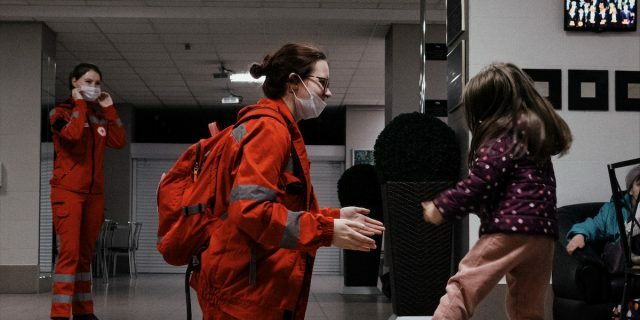
1 / 0
RKK volunteers at the collection point for victims during the emergency on Karpovka. Photo: Andrey Berendey.
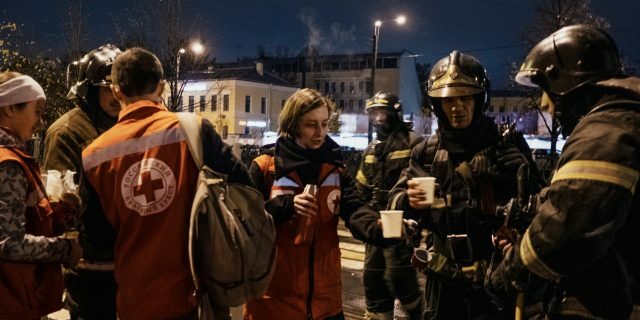
2 / 0
Psychosocial support service during an emergency on Karpovka. Photo: Andrey Berendey.
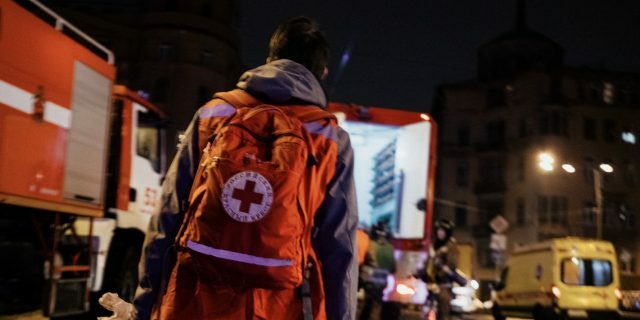
3 / 0
RKK volunteer carries water for the victims. Photo: Andrey Berendey.
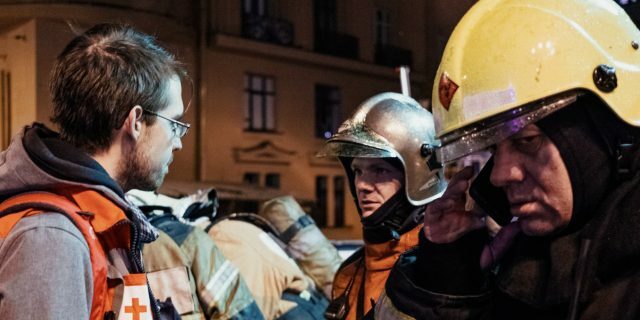
4 / 0
Liaising with emergency personnel. Photo: Andrey Berendey.
- I propose to return to the events of today. Now the Red Cross supports Ukrainian refugees. A collection of humanitarian aid has been announced throughout the country. Tell us how it started?
- On Friday, February 18, the evacuation of residents in Donetsk and Luhansk was announced. It became clear that by Saturday morning they would reach the Rostov region. Volunteers of the Russian Red Cross with a monitoring mission were already there. There was even a chairman - Pavel Savchuk. They talked to people and found out what they needed. Over the weekend, a list of necessary things was formed.
It became clear that there would be a lot of people and a full-scale operation to collect humanitarian aid would be needed. Among the first necessities for the refugees were: clothes, household appliances, products with a long shelf life.
And we launched the collection, laid out memo. Also at the federal level, we have opened a collection of money with which we can buy the necessary things.
- Is there an imbalance in the categories of things? For example, brought a lot of clothes, but little equipment?
- It happens. That's how it was in St. Petersburg. On February 22, we prepared a reception point. On the 23rd it was launched, on the 24th 7 people came there. And in a couple of days - already 120.
At some point, we realized that a third of the area was filled with diapers. There were a lot of them. Apparently, this is the first thing people intuitively thought about when we announced that 50% of the evacuees were children. Now the situation has more or less leveled off.
It became known that people leave without anything, in only T-shirts, so outerwear was needed. We try to smoothly adjust the list to avoid imbalance. We regularly tell how much we have collected.
— Have you worked in hot spots yourself?
“I didn't have that kind of experience. At the beginning of our conversation, I specified that the International Committee of the Red Cross was working in the zones of armed conflicts. And there is a fundamentally different approach. Everyone is insured, only employees go to danger zones.
Volunteers are not sent to hot spots - this is a stereotype.
But in 2017 I was responsible for external communications on the project UNHCROffice of the United Nations High Commissioner for Refugees.. It was a story about long-term care. Then there were a lot of people who came from Afghanistan and Syria.
Part of my job was to organize monitoring meetings. Real people came and told what kind of help they would like to receive, how we should change the programs.
Is there any story that you remember most from that time?
- In fact, this is a whole emotional kaleidoscope. I can tell you about a story that seemed very unfair to me.
The man and his family came from Syria. He had a degree in medicine. But it so happened that during his departure he could not take with you no documents at all. Accordingly, it was not possible to confirm his qualifications, and he faced the problem of finding a job.
And he had to get a job in a shawarma shop. That's it - in the stall there is a doctor, a man with incredible experience and just wraps the meat in pita bread. But most of all I was struck by his optimism.
He said, “I don't care what I have to do now. The main thing is that my family and I are safe. We'll get out."
Another story that really hooked me happened on the first day of the opening of the reception point. A family came: father, mother and their son - he looks about ten years old. The adults began to list: "We brought diapers, canned food, baby food ..." When they finished, a boy came forward and also began to get something.
I look, and there are toys, pencils, pens, albums... He brought all this himself. At the end, he put a wildly cool red wheelbarrow on the table and said, "This is a donation from me." Very impressed.
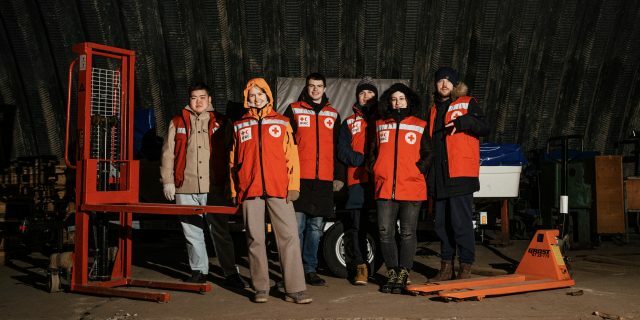
1 / 0
RKK volunteers at the warehouse for the collection of humanitarian aid. Photo: Andrey Berendey.
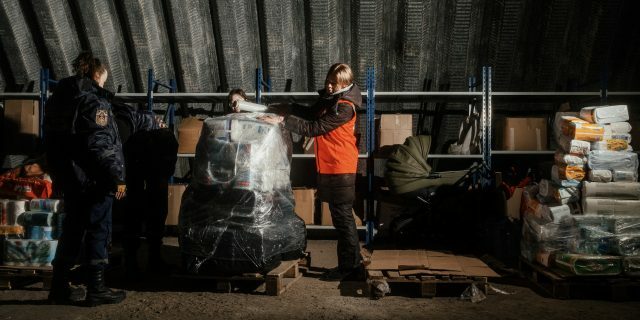
2 / 0
RKK volunteers at the warehouse for the collection of humanitarian aid. Photo: Andrey Berendey.
About volunteers and their help
— How many volunteers and employees are in your department now?
— Volunteers are the driving force, the main resource. St. Petersburg has 18 employees and 250 volunteers.
— Does becoming a volunteer mean joining one of the areas of work of the RKK? And if there are not enough hands somewhere, can volunteers be redirected there? Let's say, from emergency situations to work with migrants?
- First, I'll tell you how to become volunteers.
1. Man registered.
2. He comes to the introductory meeting, where he is told about our structure and activities.
3. He chooses what he could do, given the directions that I talked about above.
4. He is undergoing training in this area.
If we talk about emergency situations, then training consists of three stages. First, a seminar on the history of the Red Cross and its founding principles. Then - training on rendering first aid. Then - an additional lecture on working in emergency situations. And after that, the volunteer can start working.
Suppose, at some point, a person realizes, for example, that he is tired of holding master classes for children and wants to stand at the point of receiving humanitarian aid. Naturally, he can do this quite calmly after completing training in another program. This is not a very long course, so changing the sphere will turn out quickly enough.
— Who, in your opinion, most often comes to volunteer?
Everyone's motivation is different. Some people come just to chat. For them, it's a way to pass the time. Some do it for the sake of getting volunteer hours for educational institutions. This is normal motivation.
Someone wants to realize himself in a certain direction. For example, Anastasia, one of the coolest employees, told us at the first meeting: “I am a psychologist. I have ideas to develop this direction in the Red Cross.” This is how the psychosocial support program was born.
Or, for example, with a similar desire, photographers come to us who want to make reports. Photographing others, they do not notice how they themselves become volunteers. Because the external communication of the Red Cross is also a task.
What unites these people? “They don’t give a damn,” I reply.
— Could you list the basic knowledge and skills required for volunteering in emergencies?
The first is stress tolerance. Because, as a rule, you have to deal with non-standard situations. And we ourselves can not always predict the burden that will fall on our shoulders.
The second is everything related to the so-called soft-skills: teamwork, the ability to delicately exchange information and handle it.
The third is a must. If someone has promised us something, we rely on that person. I have a lot of stories when people "merged". And it's good when they say in advance that they won't be able to come.
But it happens that they pull to the last, and then an hour before the event I read a message: “I was locked in an apartment without keys, and the dog is outside.” At such moments, I think: “Well, okay, that's okay. I'm more worried about the dog, to be honest."
By the way, people of the older generation - “volunteers of the silver age” - are different responsibility. If they promised something, then 100% will do it.
— And if we talk about hard skills — specific professional skills?
- My colleagues and I joke that after NGOsNon-profit organization. you come out as a universal soldier. You know how to do everything: from working with finances to how to choose the right milk. So much can be learned within the organization.
But in general, any professional skill can be useful. If a person thinks: “I am an accountant, my help as a volunteer will not be so in demand” - this is a big delusion. On the contrary, everything related to administrative work is our weak point. We need people who are good at this.
And I could say the same thing to almost any professional: driver, logistician, SMM specialist. Delivering groceries, planning a route, creating content for social networks – all this is important and necessary.
— Has it ever happened that volunteers were injured in the course of some kind of work?
We are trying to minimize this risk. If we see that the situation is unsafe for volunteers, then they will not work there. And if they are already in place, then we resolve the issue with insurance. But as far as I can remember, none of them have been injured.
Although in June 2020 they almost received it. For four months, the coronavirus food delivery program worked perfectly, until on the last day the volunteers arrived at the last address. Together with them was a journalist filming a report on this topic. Time is 8-9 pm. Kolpino is not the most prosperous district of St. Petersburg.
And then they get out of the car with packages, in full uniform - suits, gloves, masks - and they hear a presentation from the local audience: “Did you bring the coronavirus to Kolpino?”
The situation is heating up. According to the script, if there is a security threat to the volunteers, they need to leave immediately. The guys start to roll up, run back into the car... And the journalist is stupid! And they don't make it out in time.
As a result, the windows on the wheelbarrow were broken. While leaving, they crashed into another car. The traffic police and the insurance company arrived to record the situation. And only at 4 in the morning we managed to pick up the volunteers.
In front of the partners who gave us the car for use, of course, it is inconvenient. But, thank God, everyone is alive and well.
— How long do volunteers stay in the RKK?
- It is believed that the average term of a volunteer in the Red Cross is a year. But I see the following situation: either people work for a short time - a month or two, or several years. At the same time, a volunteer can subsequently become an employee - that is, an employment contract will be signed with him.
For example, I have been working this way for 11 years. And I know some who came with me and continue to be a volunteer. If this touches a person, then he stays here for a long time.
— You have gone from a volunteer to the deputy chairman of the regional branch, right?
— Yes, I came to the Red Cross in my last year of university. I remember a classmate called me. Said, “Man, there's a topic that's going to hit you anyway. Go to the meeting." I was sure that he was calling me to some kind of sect (laughs). But I really got it.
I quickly went through the training and began to conduct trainings on HIV prevention. I really liked this program because it explains complex and important things in a simple way. And then it somehow started spinning, and now I am already coordinating the “First Aid and Emergency Response” direction.
- Judging by the stories, you have a very stressful job. How do you deal with it? How do you manage not to burn out?
- Probably, it is wrong to say that our work is one continuous stress. There are both pleasant and routine moments. But I decided a long time ago to set aside quiet hours for myself on Saturday and Sunday.
I use the rule of ten. I tell all my colleagues that they can write to me if something happens that no one but me can cope with - an event with a ten. Under these circumstances, I will certainly turn on.
For example, as in the case of the fire on Karpovka. Now this is the equivalent for me. If nothing is on fire, no one is drowning—it is necessary, as we say, to show the Red Cross ingenuity and try to resolve the issue on your own or leave it for Monday.
In addition, my child is 3 years old. Therefore, when I come home from work, I find myself in a completely different environment. In the morning - some kind of hardcore with humanitarian aid, and in the evening my daughter and I play in the store. This is a recharge.
It is also very important to have a personal hobby. It is better not to come to the Red Cross without it, especially if it becomes your main activity. For example, I love football. I go to every Zenit home game. This is a way to throw out emotions and recharge.
- Many people think that helping people in difficult life situations is difficult. Is it so? Are there any easy ways to help?
I won't be original. Any help is important. Can:
- Like, repost our publication on VKontakte. This is the simplest. Perhaps you yourself are not ready or cannot support us, but due to this like, the post will be seen by those who can.
- Bring things, help in kind – especially if you represent a company. For example, we are lucky that our partners provide us with all packaging materials. You have no idea how hard it is to find pallets and stretch films in St. Petersburg!
- Transfer donation. Life is such that we pay for electricity, we have administrative expenses. Logistics costs are generally... Money goes down the drain. Donations help a lot.
- Help remotely. We, like everyone else, write releases, make publications. We need photos, we need to proofread the text written by the press service. You can always participate at any of these stages. The most valuable thing a person can give us is his time.
Read also🧐
- “The problem is not that people are stupid, but that no one explains anything to them normally”: an interview with epidemiologist Anton Barchuk
- “If you have the opportunity to fly to Mars, you should think about it”: an interview with science journalist Ilya Kabanov
- “After my shift, I count my fingers to see if some crocodile has bitten them off”: an interview with exotologist-herpetologist Tatyana Zhamoyda
Cover: PR service of the Russian Red Cross / pisitpong2017 / Shutterstock / Lifehacker
Reliable Chinese brands: 100 little-known but very cool sellers from AliExpress
Best deals of the week: discounts from AliExpress, Love Republic, Chitay-Gorod and other stores



